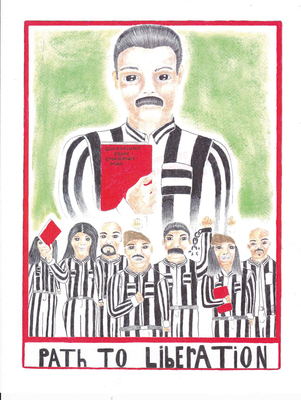I would like to inform you of a small but major win for your comrades
who have recently joined you over at the Jordan Unit. I was on that unit
two years. The entire time I was there I listened to people tell me how
they fought the rec issues there constantly to no avail. This was my
first flaw; I believed we could not win.
I realized this two years later when I was moved to another wing where
the conditions were worse. This prompted a totally different response
out of me. I researched the policies myself along with the prior
grievances others had filed. I learned several things. One was that we
were dealing with tyrants, and two, the people who were filing
grievances had been ill-informed and were not formatting them
appropriately. Their information was jumbled, they failed to utilize
policy numbers, etc. This allowed the administration to play the crazy
card.
Long story short, myself and three others went to different individuals
educating them on what was and had been going on so that they
understood. We got every grievance signed and dropped, and we organized
two demonstrations. In one protest we converged on the rec yard
simultaneously as a show of solidarity, and once told to disperse we
dispersed into smaller groups simultaneously, and once told to disperse
again, we went back to what we were doing.
The importance of these steps is to allow the administration to
understand: 1) We are together, united on this issue, all peoples, all
races; 2) We are structured; and 3) We are willing to follow orders.
This is the reason for converging, breaking down into smaller groups,
and then dismantling.
The second demonstration was an intentional 23-hour lockdown that drew
the administration out to talk to us personally. We learned the policies
they were leaning on, and their intended avenue of grievance, and in
less than 45 days our first wave of grievances came back denied. And as
they said they would do, they took their avenue of defense. But within
one more week our last grievance succeeded, and two years of problems
were settled in less than 45 days with the appropriate initiative.
There were things I felt could have been handled differently when I look
back, but this is the first of many fights to come. The battle cry is
far from over. I’m at a new place now, and we will see what experiences
are to come. The grievance process as we all know is not always a
working thing. How could it be? So in my eyes it is only a method of
exhaustion when applicable. So we use it not only for our benefit but
for the benefit of all those who stand beside us in the fight no matter
what parts they play because they may not be as informed.
The main thing I learned is that the big fight is not our petty battles,
but the fight we wage with ourselves. I met many people who could give
1000s of excuses why we couldn’t win and not one reason we could. There
are those who even believed that they deserved to be treated with no
respect because they are incarcerated. And all I could think is, “Wow!
How do we get to that point in our minds?”
So to all those that stood by in the fight I send one message: The fight
must go on. It must continue even in the face of adversity, partiality,
difference, and wanton tyrannical practices. This is the only thing that
is certain. And that certainty is found in necessity of sacrifice. There
are no exceptions, not for me, not for you, not for anyone. Prepare to
give it all every single time until it becomes practice, and hope for an
inch. Because unfortunately this is usually how it is gained, one inch
at a time. And when we begin to see far enough, we realize that our
fights were not to reap immediate benefits, but an investment in
tomorrow. Our jobs are simply to keep the fight alive so that someone,
anyone, may receive a return on the investment.
MIM(Prisons) adds: We agree with this comrade’s message of the
importance of unity, and the reality that we can only expect to win
small victories through our day-to-day battles. We know that the
grievance
system in Texas and elsewhere is set up to defeat prisoners’
complaints. But the USW campaign to demand our grievances be addressed
is helping with small battles like those described by this prisoner. At
the same time, we must keep in mind that these small victories are part
of a larger battle against imperialism as a system. And we can’t expect
to win that overnight, but we can build, and educate, as this comrade
says “as an investment in tomorrow.”






 Alabama
Alabama
 Alaska
Alaska
 Arizona
Arizona
 Arkansas
Arkansas
 Army Post
Army Post
 California
California
 Colorado
Colorado
 Connecticut
Connecticut
 Delaware
Delaware
 District of Columbia
District of Columbia
 Federal
Federal
 Florida
Florida
 Georgia
Georgia
 Guam
Guam
 Hawaii
Hawaii
 Idaho
Idaho
 Illinois
Illinois
 Indiana
Indiana
 Iowa
Iowa
 Kansas
Kansas
 Kentucky
Kentucky
 Louisiana
Louisiana
 Maine
Maine
 Maryland
Maryland
 Massachusetts
Massachusetts
 Michigan
Michigan
 Minnesota
Minnesota
 Mississippi
Mississippi
 Missouri
Missouri
 Montana
Montana
 Nebraska
Nebraska
 Nevada
Nevada
 New Hampshire
New Hampshire
 New Jersey
New Jersey
 New Mexico
New Mexico
 New York
New York
 North Carolina
North Carolina
 North Dakota
North Dakota
 Ohio
Ohio
 Oklahoma
Oklahoma
 Oregon
Oregon
 Pennsylvania
Pennsylvania
 Puerto Rico
Puerto Rico
 Rhode Island
Rhode Island
 South Carolina
South Carolina
 South Dakota
South Dakota
 Tennessee
Tennessee
 Texas
Texas
 Utah
Utah
 Vermont
Vermont
 Virginia
Virginia
 Washington
Washington
 West Virginia
West Virginia
 Wisconsin
Wisconsin
 Wyoming
Wyoming

